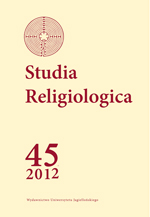What can grow from the divine seed? The divinity of human beings according to Aristotle
What can grow from the divine seed? The divinity of human beings according to Aristotle
Author(s): Sonia KamińskaSubject(s): Christian Theology and Religion
Published by: Wydawnictwo Uniwersytetu Jagiellońskiego
Keywords: animation; Aristotle; Brentano; creationism; Deity; divine seed; divinity; Eberl; embryogenesis; god / God; human being; nous; nous pathetikos; nous poietikos; soul; St. Thomas; theion sperma; traducianism; Zeller.
Summary/Abstract: This text aims to show that the core of human divinity according to Aristotle is exercising the divine mind for its own sake. Being happy and thus divine is auto-teleological, and must not be reduced to any sort of instrumental value. This reading of Aristotle excludes the theist interpretations of Prime Mover as well as the attempts at identifying the human mind with God, mainly because both these (different) interpretations seem to make auto-teleological bios theoretikos impossible. The first do this by introducing the divine provision which makes people act for God’s sake and not for their own sake. The others reduce the special status of humans by taking away the divine part, in my opinion being the sine qua non condition of the concept of human divinity. All the interpretations of human divinity which I have presented above can be useful nowadays in the ethical, (bio)ethical, social or even political discourse. This shows that the history of philosophy is not only about the past, but also about the future.
Journal: Studia Religiologica. Zeszyty Naukowe Uniwersytetu Jagiellońskiego
- Issue Year: 45/2012
- Issue No: 3
- Page Range: 173-182
- Page Count: 10
- Language: English

